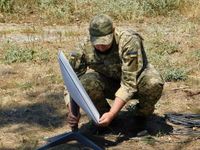Ukrainians are facing an uncertain future as they continue to rely on Elon Musk's Starlink satellite network for critical communications amid the ongoing conflict with Russia. Despite its importance, the dependency on Starlink has raised significant concerns about Ukraine's vulnerability, particularly given Musk's influential role as a senior advisor to U.S. President Donald Trump. Recent statements from Musk have underscored this precarious situation, with the billionaire warning that without Starlink, Ukraine’s "entire front line would collapse."
As the war rages on, the European Union is actively seeking alternatives to reduce Ukraine's reliance on Musk's technology. Eutelsat, a Franco-British satellite operator, has emerged as a potential backup option, although its CEO, Eva Berneke, has candidly acknowledged that Eutelsat currently cannot match the scale and efficiency of Starlink. "If we were to take over the entire connectivity capacity for Ukraine and all the citizens, we wouldn't be able to do that. Let's just be very honest," Berneke told Politico on April 7.
Starlink has become vital for various sectors in Ukraine, including military operations, hospitals, and government communications. With an estimated 50,000 Starlink terminals currently active, the system provides fast, stable, and low-latency communications essential for operations like drone control. In contrast, Eutelsat's OneWeb network has only begun supporting Ukrainian government operations with fewer than 1,000 terminals, and the company aims to scale up to 5,000–10,000 units in the future.
However, even with these plans, Eutelsat's capabilities remain limited compared to Starlink, which operates approximately 7,000 satellites in low Earth orbit, while Eutelsat has around 600. This disparity raises concerns among industry experts about the feasibility of transitioning to alternative systems quickly. As Berneke noted, "Working with Starlink is a dependence that can be decided in the White House or [Trump’s private residence] Mar-a-Lago," highlighting the geopolitical risks associated with relying on a single private provider.
The urgency for backup options has intensified following reports that the U.S. government threatened to cut off Starlink access unless Ukraine signed a critical minerals deal. This situation has added to the anxiety surrounding Ukraine's dependence on Musk's network, particularly after a meeting between Trump and Ukrainian President Volodymyr Zelensky on February 28, which led to a temporary halt in U.S. aid and intelligence sharing.
In response to these vulnerabilities, the EU is pursuing its own long-term satellite project known as IRIS², intended to provide a sovereign alternative to Starlink. However, this initiative faces significant delays and cost overruns, with an operational launch not expected until the early 2030s. Eutelsat is among the contributors to the funding of IRIS², but the timeline for its deployment means it will not provide a short-term solution for Ukraine's current needs.
Industry experts warn that cutting off Starlink could severely cripple military communications and frontline coordination, leaving Ukrainian forces exposed. A military unit representative stated, "Everything related to control, surveillance, and inflicting fire damage – whether by drops or correction – requires Starlink or any other type of reliable communication." Lyuba Shipovich, another expert, cautioned that disrupting Starlink could blind Ukrainian infantry on the frontlines, leading to increased attacks and potential strategic setbacks.
Despite the ongoing discussions about alternative satellite systems, the reality remains that Ukraine is currently left with little choice but to depend on Starlink. The situation underscores a broader issue of reliance on private technology providers in conflict scenarios, raising questions about the implications of such dependencies on national security.
As the EU and Eutelsat continue to explore options for scaling up services, the immediate future remains uncertain for Ukraine. With Musk's influence looming large, the stakes are high as the country navigates a complex landscape of military needs and geopolitical maneuvering. The reliance on Starlink not only reflects the technological advancements in satellite communications but also highlights the potential vulnerabilities that come with such dependencies in a time of war.
In the coming months, the effectiveness of Eutelsat's efforts and the EU's IRIS² project will be closely monitored as Ukraine seeks to bolster its communication capabilities and reduce its reliance on a single provider. The outcome of these initiatives could have significant implications for Ukraine's military strategy and overall resilience in the face of ongoing aggression from Russia.



